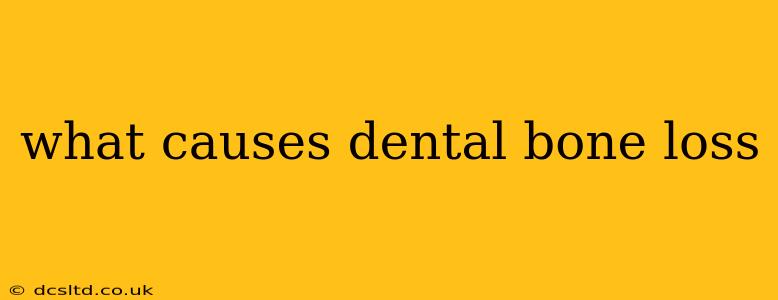Dental bone loss, also known as alveolar bone loss, is a significant concern for oral health. It's the gradual deterioration of the jawbone that supports your teeth. This loss can lead to loose teeth, tooth loss, and changes in facial structure. Understanding the causes is crucial for prevention and treatment. This comprehensive guide will explore the various factors contributing to dental bone loss, answering many common questions surrounding this issue.
What is Alveolar Bone Loss?
Before diving into the causes, let's clarify what alveolar bone loss is. This is the specific bone that surrounds and supports the roots of your teeth. When this bone deteriorates, it reduces the support for your teeth, making them more susceptible to movement and eventually loss. The severity of bone loss can vary, ranging from minor loss to significant deterioration requiring intervention.
What are the Main Causes of Dental Bone Loss?
Several factors contribute to dental bone loss, often working in conjunction. These can be broadly categorized as:
1. Periodontal Disease (Gum Disease):
This is the most common cause of dental bone loss. Periodontal disease is an infection of the gums that, if left untreated, progresses to affect the supporting bone structures. Bacteria build up along the gum line, leading to inflammation (gingivitis) and eventually destruction of the bone and soft tissues (periodontitis).
- Gingivitis: The early stage, often reversible with good oral hygiene.
- Periodontitis: The advanced stage, characterized by significant bone loss and potential tooth loss.
2. Aggressive Periodontitis:
This is a rapidly progressing form of periodontal disease, leading to significant bone loss even in younger individuals. While the exact cause isn't fully understood, genetic factors are believed to play a role.
3. Genetics:
Some individuals are genetically predisposed to periodontal disease and faster bone loss. Family history of gum disease significantly increases your risk.
4. Smoking:
Smoking severely impairs the body's ability to fight infection and heal, making individuals more vulnerable to periodontal disease and accelerated bone loss. It also reduces blood flow to the gums, hindering the healing process.
5. Poor Oral Hygiene:
Neglecting proper brushing and flossing allows plaque and tartar buildup, creating an environment conducive to bacterial growth and gum disease.
6. Bruxism (Teeth Grinding):
Chronic teeth grinding can put excessive stress on the supporting bone, contributing to bone loss over time.
7. Orthodontic Treatment:
While orthodontic treatment can improve tooth alignment, it can sometimes lead to minor bone changes. This is typically temporary and minimal.
8. Systemic Diseases:
Certain medical conditions, such as diabetes, osteoporosis, and autoimmune disorders, can increase the risk of periodontal disease and bone loss.
9. Medications:
Some medications, particularly those affecting the immune system, can contribute to increased susceptibility to gum disease.
10. Nutritional Deficiencies:
Lack of essential nutrients, like vitamin D and calcium, can weaken bones and make them more vulnerable to loss.
How is Dental Bone Loss Diagnosed?
Your dentist will conduct a thorough examination, including probing the gum pockets to assess the depth of gum recession and taking X-rays to visualize the bone levels. Further tests may be recommended depending on the findings.
Can Dental Bone Loss Be Reversed?
While complete reversal isn't always possible, the progression of bone loss can often be slowed or stopped with appropriate treatment. This typically involves professional cleaning, scaling and root planing to remove plaque and tartar below the gum line, and sometimes surgical interventions to regenerate bone.
What are the Treatments for Dental Bone Loss?
Treatment options range from non-surgical procedures like scaling and root planing to surgical interventions like bone grafting and guided tissue regeneration. The best approach depends on the severity of bone loss and individual needs.
What are the Long-Term Effects of Dental Bone Loss?
If left untreated, dental bone loss can lead to loose teeth, tooth loss, changes in facial structure, and difficulty chewing and speaking.
How Can I Prevent Dental Bone Loss?
Prevention is key! Practicing excellent oral hygiene, visiting your dentist regularly for checkups and cleanings, quitting smoking, managing underlying medical conditions, and maintaining a healthy diet are essential steps.
This guide provides a comprehensive overview of the causes of dental bone loss. Remember, regular dental checkups and proactive oral care are crucial in preventing this condition and maintaining a healthy smile. If you have concerns about dental bone loss, consult your dentist for personalized advice and treatment.
